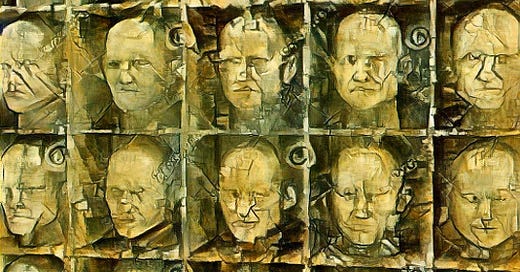In the conclusion of Iain McGilchrist’s book The Master and His Emissary, the question is asked, “What would the left hemisphere’s world look like?” if the left hemisphere of the brain “became so far dominant that, at the phenomenological level, it managed more or less to suppress the right hemisphere’s world altogether”.
In this series of posts I’d like to break down his conclusion and discus just how closely our world is conforming to the left hemisphere’s perspective.
Part #1 Part #2 Part #3 Part #4 Part #5 Part #6 Part #7
The left hemisphere prefers the impersonal to the personal, and that tendency would in any case be instantiated in the fabric of a technologically driven and bureaucratically administered society. The impersonal would come to replace the personal. There would be a focus on the material things at the expense of the living. Social cohesion, and the bonds between person and person, and just as importantly between person and place, the context in which each person belongs, would be neglected, perhaps actively disrupted, as both inconvenient and incomprehensible to the left hemisphere acting on its own. There would be a depersonalisation of the relationships between members of society, and in society’s relationship with its members. Exploitation rather than co-operation would be, explicitly or not, the default relationship between human individuals, and between humanity and the rest of the world. Resentment would lead to an emphasis on uniformity and equality, not as just one desirable to be balanced with others, but as the ultimate desirable, transcending all others. As a result individualities would be ironed out and identification would be by categories: socioeconomic groups, races, sexes, and so on, which would also feel themselves to be implicitly or explicitly in competition with, resentful of, one another. Paranoia and lack of trust would come to be the pervading stance within society both between individuals, and between such groups, and would be the stance of government towards its people. (Iain McGilchrist, The Master and His Emissary).
McGilchrist continues to reinforce the fact that the left hemisphere cannot have direct relationship with individuals but needs to keep everyone at arms length via the abstractions of categorisation. Categorisations that depersonalise and decontextualise the individual so they better fit a more uniform, less complex, and more malleable (from the Latin ‘to hammer’ - and doesn’t that feel right?) object for the sake of utility.
The focus on material things brings the world within the grasp of the left hemisphere, whereas the living can be too relational and flowing for any such grasp. In fact, it’s relationships - those intangible forces between ‘things’ that the left hemisphere has trouble with, and thus the static and inanimate are preferred over the living. The spreadsheet, that static snapshot of abstractions frozen in time, becomes more important (and comprehensible) than the dynamic lived experience of the one who is being represented by the numbers on the spreadsheet. Thus the bureaucrat is so often the epitome of a left hemisphere creature who doesn’t look up from the clipboard to see the person but is rather fixated on ticking the correct box (being the more important and comprehensible thing at hand).
The categorisation of people mentioned here is exactly what we are seeing in “race Marxism” (so brilliantly analysed by James Lindsay) where the sharp delineation of races belies any similarities (which are pervasive and obvious). And not only the categorisation but the sense of competition, resentment and paranoia, also come right out of the race Marxism playbook and eagerly adopted by a left hemisphere biased society.
Not only between the categories of race, but between the larger categories of ‘the government’ and ‘the people’ does an increasing paranoia develop, resulting in actions that reinforce such paranoia. Or the ‘believers in The Science’ and ‘the deniers’ - same story. The animosity between groups, I would say, does not mean both sides are under the deluded perceptions of a dominant left hemisphere. It only takes one side for the competition, paranoia, and animosity to explode, as we have seen. This is a case where it takes only one to tango!
I must point out, however, that I don’t believe a left hemisphere bias in society (which leans towards symptoms of schizophrenia) is the full picture of all the ills we are suffering, although it does provide a compelling variable. Another important variable is psychopathy in places of political power (see Harrison Koehli’s Substack who has a good handle on Political Ponerology having edited the book of the same name by Andrew Lobaczewski). And so broadly the variables are psychopathology - pervasive schizoid leanings in the general population punctuated by tyrannical leadership by psychopaths - no wonder it feels like we are in an insane asylum.
What are your thoughts?
Do you see the erosion of social cohesion, the displacement of relationship between people, place, and contexts for the decontextualised abstraction of a left hemisphere world?
Let’s talk about it…





Share this post